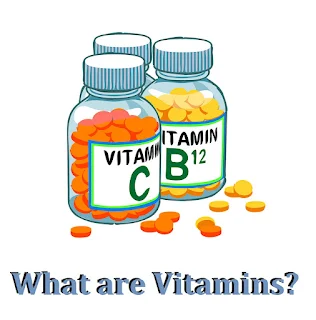Vitamins
What are Vitamins?
Vitamins are essential nutrients that enable your body to work properly and to stay healthy. Most vitamins can be found in the food that we eat or from vitamin supplements.
The solubility of a vitamin determines how that vitamin acts within the body, they can either be fat-soluble or water-soluble.
Fat-soluble vitamins
Fat-soluble vitamins are soluble in lipids (fats). They are
absorbed in fat globules that travel into general blood circulation through the
lymphatic system of the small intestine. Fat-soluble vitamins are:- Vitamin A,
Vitamin D, Vitamin E Vitamin K.
Water-soluble vitamins
Water-soluble vitamins are not stored in the body, meaning
the body needs a continuous supply of them in order to get the required
nutrients. Water-soluble vitamins are: Vitamin C, Vitamin B1 / B2 /
B3 /B5/ B6 /B9/ B12.
Role of vitamins
The nutrients that you get from vitamins helps your body to
carry out essential functions such as:
➤Production of skin, bone and muscle
➤Strengthening of the immune system
➤Maintenance and repair of cells, tissues and organs
➤Converting food into energy
Vitamin A (Retinol)
Formula: C20H30O
Vitamin A (also Known as retinol) is key to good vision, a healthy immune system, and cell growth. There are two types of vitamin A. The first is about the active form of vitamin A Retinoids which comes from animal products. Beta-carotene is one of the other types of vitamin A, which comes from plants.
Vitamin C (Ascorbic acid)
Formula: C6H8O6
Vitamin C (Ascorbic Acid) is a potent reducing and
antioxidant agent that functions in fighting bacterial infections, in
detoxifying reactions, and in the formation of collagen in fibrous tissue,
teeth, bones, connective tissue, skin, and capillaries. Found in citrus and
other fruits, and in vegetables, vitamin C cannot be produced or stored by
humans and must be obtained in the diet. Vitamin C is a natural water-soluble
vitamin.
Vitamin D (Ergocalciferol)
Formula: C28H44O
Vitamin D is a fat-soluble vitamin indicated for use in the
treatment of hypoparathyroidism, refractory rickets, also known as vitamin D
resistant rickets, and familial hypophosphatemia.
Vitamin E (tocopherol or alpha-tocopherol)
Formula: C29H50O2
A vitamin E test measures the amount of
vitamin E in your blood. Vitamin E (also known as tocopherol or
alpha-tocopherol) is a nutrient that is important for many body processes. It
helps your nerves and muscles work well, prevents blood clots, and boosts the
immune system. Vitamin E is a type of antioxidant, a substance that protects
cells from damage.
Vitamin K (Phytonadione)
Formula: C31H46O2
Vitamin K (Phytonadione) plays a key role in helping the
blood clot, preventing excessive bleeding. Unlike many other vitamins, vitamin
K is not typically used as a dietary supplement. Vitamin K is actually a group
of compounds. The most important of these compounds appears to be vitamin K1
and vitamin K2. Vitamin K1 is obtained from leafy greens and some other vegetables.
Vitamin K2 is a group of compounds largely obtained from meats, cheeses, and
eggs, and synthesized by bacteria.
Vitamin B1 (Thiamine)
Formula: C12H17N4OS+
Vitamin B₁ (Thiamine), Thiamine or is a vitamin found in food and
manufactured as a dietary supplement and medication. Food sources of thiamine
include whole grains, legumes, and some meats and fish.
Vitamin B2 (Riboflavin)
Formula: C17H20N4O6
Vitamin B2 (Riboflavin). It is widely found in both plant-
and animal-based foods, including milk, meat, eggs, nuts, enriched flour, and
green vegetables. Riboflavin is involved in many body processes. It's required
for the proper development of the skin, lining of the digestive tract, blood
cells, and brain function.
Vitamin B3 (niacin)
Formula: C6H5NO2
B vitamin (Niacin) that's made and used by your body to turn
food into energy. It helps keep your nervous system, digestive system and skin
healthy. Niacin (vitamin B-3) is often part of a daily multivitamin, but most
people get enough niacin from the food they eat. Foods rich in niacin include
yeast, milk, meat, tortillas and cereal grains.
Vitamin B6 (pyridoxine)
Formula: C8H11NO3
Vitamin B6, or pyridoxine, is a water-soluble vitamin found
naturally in many foods, as well as added to foods and supplements. Pyridoxal
5' phosphate (PLP) is the active coenzyme form and most common measure of B6
blood levels in the body.
Vitamin B12 (cyanocobalamin)
Formula: C63H88CoN14O14P
Vitamin B12 (Cyanocobalamin is a man-made form) used to
prevent and treat low blood levels of this vitamin. Most people get enough
vitamin B12 from their diet. Vitamin B12 is important to maintain the health of
your metabolism, blood cells, and nerves. Serious vitamin B12 deficiency may
result in a low number of red blood cells (anemia), stomach/intestine problems,
and permanent nerve damage.
Vitamin B5 (Pantothenic acid)
Formula: C9H17NO5
Vitamin B5 (also Known as Pantothenic acid) is an essential
nutrient that is naturally present in some foods, added to others, and
available as a dietary supplement. The main function of this water-soluble B
vitamin is in the synthesis of coenzyme A (CoA) and acyl carrier protein.
Vitamin B7 (Biotin)
Formula: C10H16N2O3S
Biotin, also called vitamin B₇, is one of the B vitamins. It is
involved in a wide range of metabolic processes, both in humans and in other
organisms, primarily related to the utilization of fats, carbohydrates, and
amino acids.
Vitamin B9 (Folate or folic acid)
Formula: C19H19N7O6
Folate is the natural form of vitamin
B9, soluble in water and found naturally in many foods. It is also added to
foods and sold as a supplement in the form of folic acid.

